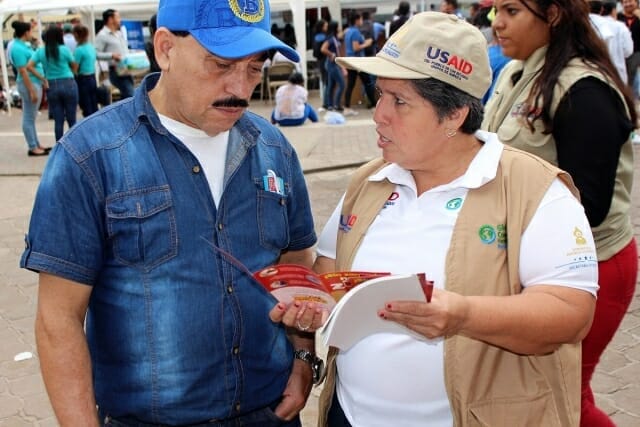News > Blog
Honduran Community Leaders Limit Spread of Zika
Published 08/29/2019 by Global Communities

By Harry Sanderson
This article was originally published on the US Global Leadership Coalition website
Over his 23-year career, Angel David Rodriguez has gradually incorporated health topics into his classroom curriculum at the suggestion of the Honduran Ministry of Health. As a math and science teacher, Rodriguez never imagined he’d be working hands-on as a medical volunteer himself. But, with the rapid spread of the Zika virus in Honduras, Rodriguez jumped into action.
With help from the U.S. Agency for International Development (USAID) Nuestra Salud (“Our Health”) program, volunteers like Rodriguez are taking on roles as community leaders to educate younger Hondurans about the dangers of mosquito-borne Zika— which can cause serious birth defects if contracted by pregnant women. In September 2016, Global Communities began partnering with USAID on Nuestra Salud, a three-year program to stem the spread of the virus in Honduras, where there were about 36,000 cases of Zika at the time.
The program set out to encourage community involvement in Zika prevention efforts and improve existing containment procedures to effectively diminish the spread of the virus. The program’s staff also worked hand in hand with the Honduran Ministry of Health to mobilize a rapid response and target some of the country’s poorest and most vulnerable communities.
Nuestra Salud focused its efforts in five of Honduras’ most affected cities—Tegucigalpa, San Pedro Sula, Choloma, La Lima, and Villanueva— and reached 36 health facilities and 360 of the most at-risk communities through direct interventions.
Within these communities, the program trained over 1,200 community volunteers and 1,100 teachers to educate others about the conditions where mosquitos are most likely to breed as well as how the Zika virus is transmitted.
As one of the teachers trained to educate his community about Zika, Rodriguez has worked closely with program staff to ensure he effectively conveys the message to his students and their families.
“Our strategy with students goes beyond addressing the issue of Zika in the classroom,” he said, “We must understand that this knowledge is taken home and put into practice in their homes and communities.”
This strategy involves the integration of Zika education into the teachers’ daily lesson planning, as well as extracurricular activities. In 2018, Rodriguez and other volunteers carried out 111 different school activities – including poetry, singing competitions, and musicals – that incorporated Zika prevention messaging to raise awareness among students.
Additionally, with the support of their parents and teachers, students applied their knowledge of Zika to create models of the virus, which they utilized to participate in games at school and within their own homes and communities.
By the end of 2018, these programs had reached over 28,000 students at 76 schools— helping to educate a new generation about the Zika virus.
As the program draws to a close in September, there are just 600 active Zika cases across Honduras. Thanks to Nuestra Salud, USAID and Global Communities have helped Honduras stem the Zika virus, creating the possibility of a healthier, more prosperous future.





